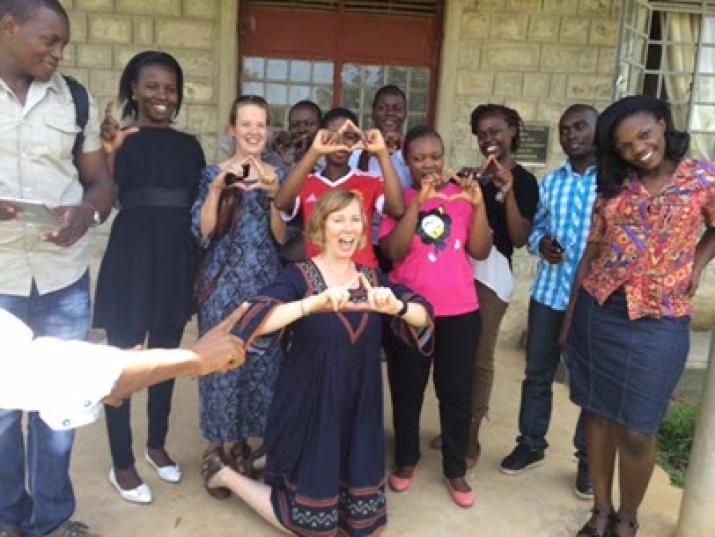
Co-PIs Kathryn Whetten and Shannon Dorsey, third and fourth from left, and part of their team from ACE, their collaborating NGO in Bungoma County, make "A"s with their hands for "ACE." Others in the photo include counselors, interviewers and the data entry team.
Published August 21, 2017, last updated on June 3, 2020 under Research News
Eighty percent of the world’s population lives in low and middle-income countries, yet these countries spend less than two percent of their budgets on mental health. The result is a devastating mental health treatment gap and an increasing number of years lost to disability due to mental health disorders. African nations have the world’s lowest ratio of mental health professionals at 1.4 per 100,000 people.
Research suggests that mental health treatments can be delivered effectively in low- and middle-income countries using a task sharing approach, in which lay counselors with little or no prior mental health experience are trained to provide treatment.
Kathryn Whetten, professor of public policy and global health and director of the Center for Health Policy and Inequalities Research (CHPIR), thinks this approach has the potential to narrow that treatment gap. She’s been awarded a five-year $3.4 million grant from the National Institute of Mental Health that aims to evaluate the scaling-up of task sharing mental health care in Kenya. Shannon Dorsey, associate professor of psychology and global health at the University of Washington, is also a principal investigator on the grant.
Whetten and Dorsey’s past studies have demonstrated that trauma-focused cognitive behavior therapy is both effective and well received in Kenya and Tanzania. They’ve also learned that scaling up an intervention of this type requires partnering with the government, in this case the education and health sectors. With enthusiastic government and provider support, a low-cost and sustainable strategy to implement task sharing mental health services is possible. By training teachers (via the education sector) and community health volunteers (via the health sector) to provide mental health care, a larger population could potentially be reached.
Scaling Up Mental Health with the Kenyan Government
Before programs are scaled up country-wide, it’s important to know not only what policies to implement but also their predicted implementation success and intervention effectiveness. This study aims to identify implementation strategies and examine whether the education and/or health sectors are productive partners in scaling up task sharing mental health care in future programs. One of the most promising aspects of the study is the researchers’ partner: the Kenyan government.
“This is one of the few times I’ve been involved in research where we’re directly working with a government—a sustainable entity—and scaling up an intervention that has been shown to work within that system,” said Whetten.
The study will take place in Kanduyi, a sub-county in southern Kenya, and focuses on children orphaned by one or two parents. Growing evidence demonstrates that orphaned children in low- and middle-income countries are at high risk of post-traumatic stress, but mental health professionals are largely unavailable in this area.
Forty primary schools in the area will be randomly selected to participate in the study. A team of teachers and a team of community health volunteers from each school district will provide two sequential eight-week sessions of trauma-focused behavioral group therapy. Teachers will deliver the intervention during “game times” at school, while health volunteers will work during their normal hours. The study focuses on evaluating the success and sustainability of these interventions.
“This grant will not actually pay for any of the intervention, only the evaluation part,” said Whetten. “To be able to work with the Kenyan government like that and have both the Ministry of Health and Ministry of Education say, ‘We want to do this, we want to train, we want you to supervise our teachers and village health workers and see if it works,’ is incredibly exciting.”
A Novel Evaluation Methodology
This study will identify actionable practices that impact mental health delivery and examples of policies that best predict program sustainability. The researchers will also assess whether the children’s mental health improved, whether there were other societal benefits and what the total cost of the intervention was. By examining these factors, they plan to clarify what constitutes an “enabling” context— that is, what policies and practices are necessary to effectively deliver mental health interventions like this one through education and health sector pathways.
To evaluate the implementation success, the researchers will use a novel method called “qualitative comparative analyses.” Only recently applied to health services and never to mental health, this methodology allows for determining causality in complex health studies and for leveraging the benefits of both quantitative and qualitative research.
“Evaluating something that is occurring in real-life is much more difficult than it is for a randomized controlled trial,” said Whetten. “We’re pushing the methodology in implementation science forward, and that’s very exciting too.”
Looking Forward to the Future
If the study goes well, this task sharing approach to mental health care could be replicated in other locations. By teaching lay people manualized mental health treatments and having licensed practitioners supervise their work, other countries stand to reach exponentially more kids as well.
“If we can show that this approach is effective in this area of the world, then we might be able to bring it to the United States and other places,” Whetten said. “My ultimate dream is to see this type of program eventually implemented in the school systems in Durham [North Carolina], too.”


